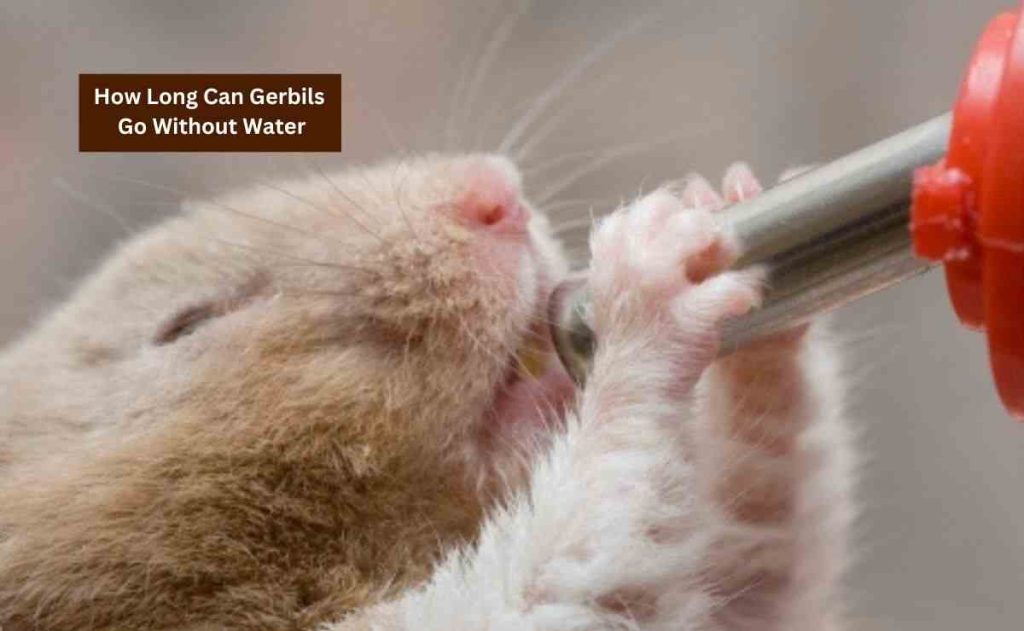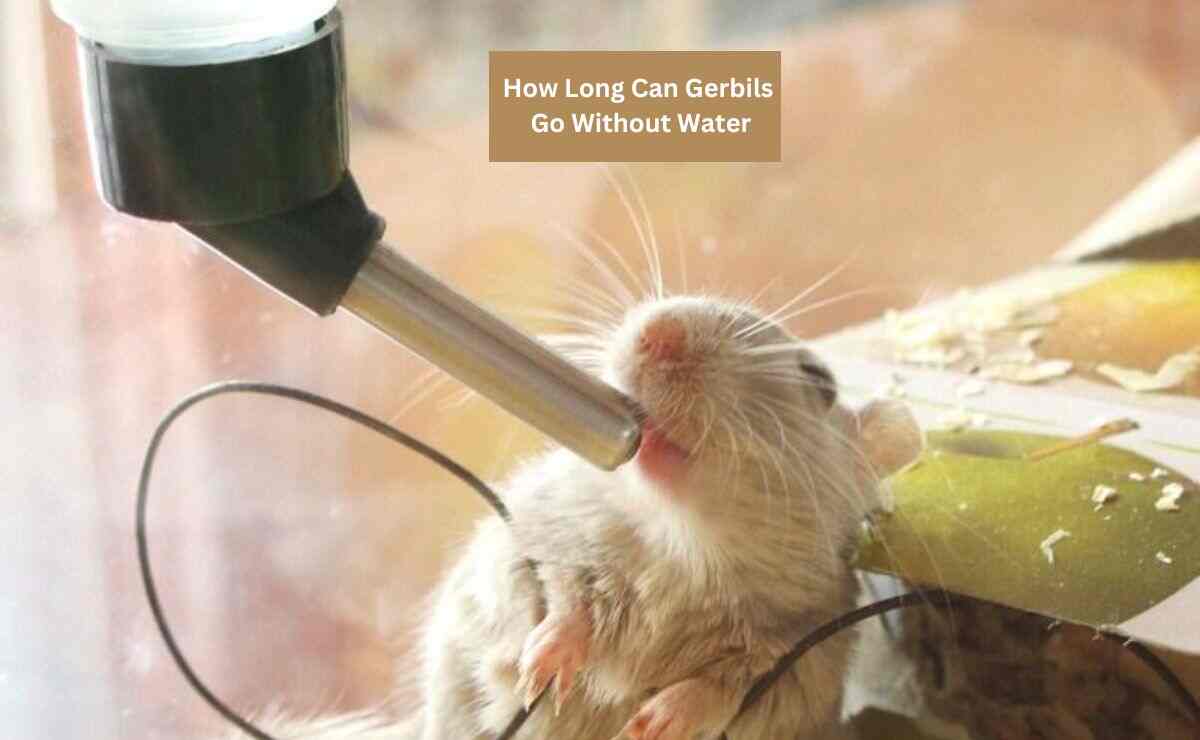Water is super important for all living things. It keeps us alive and helps us stay healthy. We need it for food, energy, staying clean and just overall well-being. Now, animals also need water, and that includes gerbils. But here’s the thing: gerbils live in places where water is not always easy to find.
So, ever you wondered how long can gerbils go without water? Well, you’re not alone. Pet owners often wonder how these little creatures manage in areas where water is scarce.
Typically, gerbils can only manage without water for a short span, approximately 2 to 3 days, before it starts impacting their health. If you plan to be away for an extended period, ensuring your gerbils have enough water to consume. Consider the duration of your absence and make arrangements accordingly to prevent them from getting dehydrated.
How Long Can Gerbils Go Without Water?

Gerbils are small desert-dwelling rodents that can survive in arid environments. As such, they have the ability to go for significant periods of time without water.
However, it is important to note that while gerbils can tolerate dehydration better than many other animals, they still need access to fresh water on a regular basis for optimal health.
In general, gerbils can go without water for around 2 to 3 days, max 4 days. During this time, they rely on their bodies’ ability to conserve water by producing concentrated urine and minimizing water loss through respiration and perspiration.
Surprisingly, a study in the Journal of Mammology discovered that gerbils can survive 29 days without water. Despite being small, they are able to endure in desert environments, surpassing the expectations of small animals.
They also obtain moisture from the food they consume, as many gerbils have a diet that includes fresh fruits and vegetables with high water content.
That being said, every pet owner should provide gerbils with a constant supply of clean, fresh drinking water. Dehydration in gerbils can lead to serious health issues, such as urinary tract problems, kidney damage, and even death.
You can use a water bottle with a sipper tube that attaches to the side of the gerbil’s enclosure, as this helps to prevent contamination and spillage.
Also, you have to ensure that your gerbil has a balanced diet that includes foods with high water content, such as cucumbers, tomatoes, lettuce, and apples. This can help to supplement their hydration needs and reduce the risk of dehydration.
If you notice that your gerbil is not getting enough water or is showing signs of dehydration, such as lethargy, dry skin, or sunken eyes, you should attend veterinary attention immediately.
How Gerbils Manage Water in the Wild?
The survival skills of gerbils are excellent in the wild. They are native, particularly in arid or semi-arid regions like deserts, steppes, and savannas where water is a precious commodity. These areas pose challenges with low precipitation, high temperatures, and low humidity, making it tough for animals to find ample water sources.
As a result of such harsh environments, gerbils have evolved ingenious strategies for surviving. Their ability to extract hydration from their meals shows that they are capable of sourcing a significant portion of their water from their food. Moreover, gerbils have physiological mechanisms to conserve water effectively.
Despite these remarkable adaptations, it remains important for gerbils to have access to clean, fresh water. Dehydration can still pose a serious threat, and in the wild, where resources are unpredictable, they successfully manage water consumption and stay hydrated.
How Much Water Gerbils Drink?
The answer lies in the delicate balance of their hydration needs. Gerbils can extract some water from the food they consume; still, you have to supply water when they are enclosure.
Surprisingly, gerbils only require about 1-2 ounces of water per day. They can go a day without any issues, but beyond 24 hours without water. But after that, you can notice the signs of dehydration. Watch out for behaviors like licking surfaces or digging around their water source. Dehydrated gerbils may exhibit sunken eyes, less full skin, and general listlessness.
Deprivation of water can quickly spiral into dehydration, a serious health concern for gerbils. Owners should be attentive, ensuring a reliable source of hydration by providing a water bottle or shallow dish filled with clean water that is refreshed daily. Opting for uncontaminated water that is free of substances like chlorine or heavy metals.
Owners can offer fresh water or wet foods like cucumber or grapes to supplement their hydration. In extreme dehydration cases, subcutaneous fluids may be necessary to rehydrate them. Understanding the nuances of gerbil water consumption is pivotal for maintaining their health and ensuring a happy, hydrated furry companion.
How To Know if My Gerbil is Dehydrated?
Always keep a close eye on your gerbils and monitor their water intake to identify signs of dehydration. It’s an important responsibility of pet ownership.
Watch out for common symptoms that might indicate dehydration in gerbils. Lethargy, dry and flaky skin, sunken eyes, a decreased appetite, and dark urine are telltale signs that your gerbil might be in need of more water. If you observe unusual behavior, such as increased water consumption or heightened thirst, it’s essential to act promptly.
If dehydration is suspected, provide your gerbil with fresh water immediately and observe their condition closely. Early intervention can make a significant difference. Keep in mind that severe dehydration poses a life-threatening risk.
You should provide a balanced diet to maintain their hydration level. Consider including hay, fresh vegetables, fruits, seeds, nuts, and mealworms in their diet to promote overall health and vitality.
Also Read : gerbils can live without food for how many days?
How Do I Give Water To My Gerbils?
As a first-time gerbil owner, you should make proper water arrangements for your pets. Firstly, there’s the water bottle, a small container that attaches to the cage’s side, equipped with a spout that releases water when your gerbil licks it.
Water bottles are convenient, easy to clean, and prevent contamination from bedding or food. However, it’s crucial to regularly check for any blockages in the spout and ensure the bottle is securely attached to the cage.
On the other hand, there’s the water dish, a shallow container filled with water and placed inside the cage. Some gerbils may even enjoy splashing around in it. However, water dishes can be a bit trickier to keep clean and might be prone to spills, leading to wet bedding or an unhealthy environment.
Regardless of your chosen method, the key is consistency. Regularly clean the water container and provide fresh water every day to ensure your gerbil stays happily hydrated. By choosing the right hydration approach, you contribute to your gerbil’s well-being and foster a healthy and comfortable living environment.
What Liquids Are Safe for Gerbils?
When it comes to quenching thirst, gerbils have a simple preference: water. It’s the safest and healthiest option for these little creatures.
There is no need to give your gerbil any other liquids, such as juice, milk, or soda. These drinks contain added sugars or chemicals that could upset their stomach and lead to health issues. It’s crucial to prioritize their health by sticking to the basics – clean, fresh water.
Moreover, avoid offering alcohol and caffeinated beverages to your gerbil at all costs. These substances are toxic to them and can have severe consequences on their health. Keeping their drink options limited to water ensures a straightforward and healthy hydration routine.
Final Words
Gerbils have the ability to go without water for several days, but you shouldn’t practice it. You have to give them a constant supply of fresh drinking water to maintain their health and prevent dehydration-related issues.
Also, regularly changing the water and cleaning the bottle or bowl helps prevent bacterial growth. It will help them to stay healthy and hydrated all the time.
